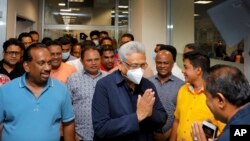Former Sri Lankan President Gotabaya Rajapaksa, who fled the country after facing widespread protests over the nation’s economic collapse, returned to Colombo Friday.
Political analysts said that while there is popular anger at his return, it is unlikely to be expressed through similar protests because of repressive measures taken by the government against some leaders of the citizens movement that led to his exit.
Rajapaksa came back from Bangkok, where he had been staying on a temporary visa. He left Sri Lanka seven weeks ago on a military plane, after monthslong chants of “Gota Go Home” filled the streets, culminating with hundreds of protesters storming his official residence.
He first went to the Maldives, then Singapore and finally to Bangkok. On his return, he was welcomed by lawmakers from his party at the airport.
Demonstrators had blamed Rajapaksa’s government, in which his family members held powerful positions, for the dire economic crisis that has led to skyrocketing inflation and crippling food and fuel shortages.
The citizens movement had dismantled the nearly two-decade-long grip on power of the powerful Rajapaksa political dynasty. Even before Rajapaksa left the country, his brothers, who held powerful posts in the government, including that of prime minister, had resigned as an enraged public blamed the family for corruption and for policies that contributed to the country’s economic ruin.
But the protests died down after Rajapaksa’s successor, President Ranil Wickremesinghe, cracked down on the movement. Days after he took office, troops dismantled the main camp in front of the presidential secretariat, where the protests were held. Three student union leaders, who were at the forefront of the protests, were arrested last month under stringent anti-terrorism laws.
Wickremesinghe took office in July with support from the party over which the Rajapaksas hold influence and which has a majority in Parliament. Protesters and opposition politicians had accused Wickremesinghe of lacking political legitimacy and protecting the Rajapaksa family.
There are, however, demands for action against the former president.
“There is anger in the country and people are asking why Gotabaya has come back, but there are unlikely to be fresh protests due to the crackdown by the government,” Paikiasothy Saravanamuttu, head of the Center of Policy Research in Colombo told VOA. “However, people will want to take him to court to answer allegations that he faces such as corruption.”
“We will call on the government to investigate allegations against Gotabaya Rajapaksa which include that of using public money for personal use,” Tharindu Jayawardhana, a spokesman of the Sri Lanka Young Journalists Association in Colombo, told VOA.
Joseph Stalin, general secretary of the Sri Lanka Teacher’s Union, told AFP that he should be prosecuted. “He should be arrested for causing such misery for the 22 million people of Sri Lanka.”
Some analysts also said that the former president’s return could pave the way for the powerful Rajapaksa clan to make a bid to reassert itself politically in the island nation.
“His return shows they have no regard to the issues raised by the huge citizens' movement that forced them to step down,” political analyst Jayadeva Uyangoda in Colombo told VOA. “They want to erase the memory of the movement and once again consolidate their grip on politics.”
Meanwhile, a preliminary agreement that the government reached with the International Monetary Fund this week for a $2.9 billion bailout package has raised hopes as the first tentative step in rescuing the country’s battered economy.
“Getting an agreement with the IMF is the only game in town,” Murtaza Jafferjee, chairman of the Advocata Institute in Colombo told VOA. But he pointed out that it could still take four to six months before the funds flow in. “Before that we have to show progress with our debt restricting efforts and fiscal consolidation.”
Sri Lanka has defaulted on its foreign debt of about $51 billion and is desperately short of foreign exchange. Economists say getting the country, which was counted as a middle-income nation some years ago, back on its feet will be a long haul.




